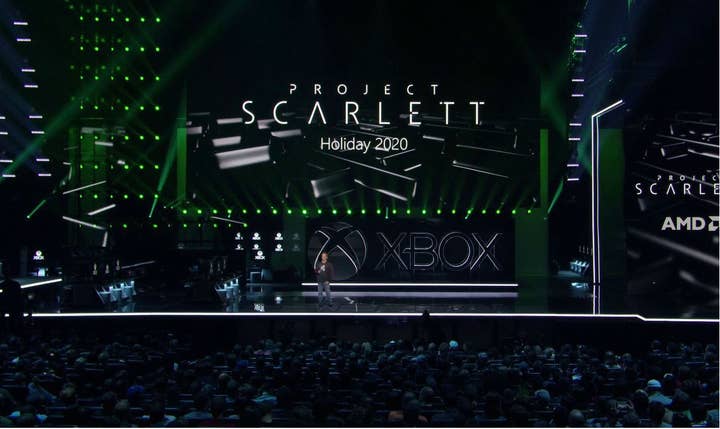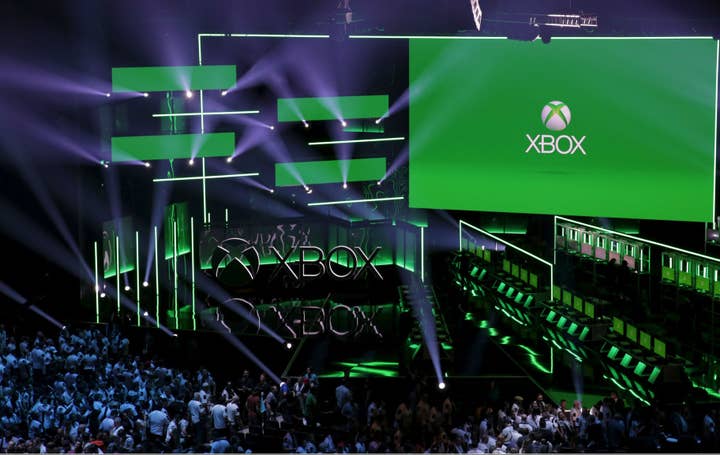Next-gen expectations overshadowed E3 | Opinion
Rather than being a final hurrah for the current generation, E3 highlighted expectations that most upcoming titles will bridge next year's hardware transition
Every console generation has a swansong E3, and that's exactly what this year's show ought to have been -- the last major wave of software for this generation of hardware, much of it bigger, more beautiful and more ambitious than anything its creators have attempted on PlayStation 4 and Xbox One to date.
Much as the twilight of the last generation brought with it a number of platform-defining titles, letting the Xbox 360 and PS3 go out on a high, this generation's consoles have saved the best for last. It's inevitable, of course; these are the games developers make when they've had years to perfect their craft on these machines, learning how to extract the maximum performance from the hardware, how best to build gameplay around their features, and tracking the evolution of their audience and its tastes.
Yet even if many of the games we saw this week had "swansong title" written all over them, this year's E3 simply didn't feel like that. To some extent that's because of the status of the console platform holders. Nintendo is actually still relatively early in the Switch lifecycle, of course, while Microsoft's lacklustre performance in this generation means that it's anxious to talk about the future rather than stretching out on the laurels of the present. Sony, the company with most to gain from a protracted Indian summer for the current generation, was conspicuous by its absence from the show.
"We are facing a console transition that is going to be tricky to present to mass-market consumers as much more than a step change"
It's not just those factors that robbed E3 of its sense of being a swansong show, though; it's the overarching sense of continuity that the console market has taken on in recent years. We know that both Microsoft and Sony are proceeding with very linear updates of their existing hardware for the next generation, which promises fairly universal backwards compatibility and makes the updating of late-stage PS4/Xbox One titles for re-release in "enhanced" PS5/Xbox Two (Xbox 720? Xbox 1080?) into a relatively low-effort task -- and thus a commercial no-brainer -- for developers and publishers. As such, many of the consumers watching announcements and trailers for new titles this week seem to be working on the assumption that they'll be generation-spanning releases -- that they're not just the swansong of the old hardware, but also the vanguard of the new.
This isn't a new phenomenon, of course. Nintendo has been doing this kind of thing on a small scale ever since Twilight Princess launched near-simultaneously on the venerable GameCube and the brand-new Wii. More relevantly, gamers' expectation that this is how game releases in the latter stages of a console's lifespan will play out have been primed by the experience of the last hardware transition, when titles like Grand Theft Auto V and The Last of Us, along with a host of others, were given a fresh coat of digital paint and pushed out as early releases for the PS4 and Xbox One.
That was a much more involved process than the current transition is likely to be, especially on the PlayStation side as the PS4's architecture was a major, albeit welcome, departure from the proprietary design of the PS4. As such, we can expect this kind of approach to be the rule rather than the exception over the coming year or two.
"I could see PS4 and Xbox One co-existing with their newer successors for quite a long time"
That's sensible and, honestly, while it will have its detractors -- especially since some of those "enhanced" versions probably aren't actually going to be all that enhanced -- it's largely speaking a welcome move. It'll give the new consoles a solid base of good-looking, polished games early on, while keeping owners of the old consoles happy; that's a win-win situation, even if more truly exclusive titles on the new hardware would of course be a much stronger driver of sales. However, it still inevitably changes consumers' perceptions both of the games themselves and of the hardware they'll run on.
This latter aspect is important, I think, because even without considering the software "bridging" the two generations, we were already facing a console transition that was going to be tricky to present to mass-market consumers as much more than a step change. Some aspects of the new hardware are impressive, with the focus on SSDs being entirely justified by the substantive difference they'll make in many games -- but the actual change in visual fidelity and capability is going to be even smaller than last generation's shift was.

This is exacerbated by the existence of Xbox One X and PS4 Pro, whose 4K abilities were welcome upgrades in this generation but unquestionably robbed the next generation of what would have been one of its biggest selling points. The reduction in the size of the gap between generations is inevitable, of course -- it's a product of the diminishing returns we're currently seeing across the board in computing hardware -- but combined with the bridging software releases, it's going to have significant consequences on how the next generation shapes up in its early years.
"The next generation transition will be the smoothest, and perhaps least exciting, of all time"
Consider; we're going to see new hardware launched which will be broadly similar to the existing consoles -- upgraded, but not in the kind of way that makes for jaw-dropping comparisons in screenshots or on YouTube. It's going to run, in the early months and years at least, many of the same games. While there will be plenty of consumers who get excited about the upgrade, for a lot of others it's simply going to feel far less essential than previous generation shifts. I could see PS4 (and Xbox One, albeit to a lesser extent) co-existing with their newer successors for quite a long time - much longer than previous generations of consoles have successfully overlapped.
That's no bad thing, of course. Correctly managed, the ability to drop their price of that hardware (which has held its pricing over the course of this generation to a remarkable degree) while keeping it on the market alongside a "premium" new console could help to open up whole new markets -- especially since the old consoles won't actually be obsolete in the traditional sense, as games you buy for them will likely remain playable even if you upgrade to the new system, and many new games will likely continue to have PS4 versions for a few years to come.
It's not all sunlit uplands, though. The likely survival of the current generation of hardware as a parallel market for several years will also create issues for publishers and developers potentially forced to support old hardware for rather longer than they'd like to. I find myself in mind of the Square Enix online RPG Final Fantasy XIV, which found itself hampered by the need to continue supporting a PS3 player base on equal footing with the PS4 and PC versions for many years beyond the last console transition. Non-online games have less of a problem, but nonetheless it represents a fragmentation in the development process that many companies may find frustrating to manage.
How exactly Sony and Microsoft choose to build their next-gen strategy, of course, remains a little unclear. In broad strokes, Sony will no doubt be keen to strike a healthy balance between keeping PS4 alive and making PS5 attractive, while Microsoft may be more inclined towards a clean break with the previous generation. Neither firm seems quite as committed to direct competition as it was in the past, though of course we can expect each to cheerlead for their own corner -- and we'll spend much of the rest of this year finding out the details.
Sony will no doubt have a bombastic riposte to Microsoft's E3 unveiling of next-gen hardware details at some point later in the year, but E3 has already made it clear where people's expectations lie. No swansongs here; major titles will all end up playable on current and next-gen hardware alike, meaning that short of a major bombshell, the next generation transition will be the smoothest, and perhaps least exciting, of all time.









